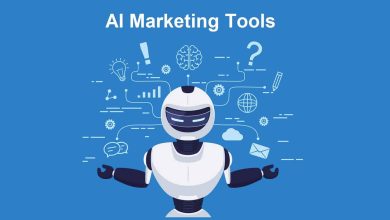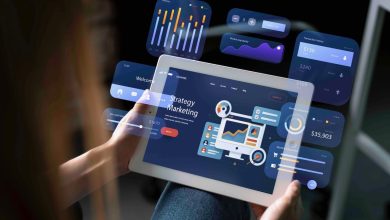
Artificial Intelligence (AI) is no longer a futuristic concept; it is a present-day catalyst transforming industries, especially marketing. As AI adoption accelerates, businesses must decide whether to embrace it now, delay implementation, or risk falling behind.
The marketing landscape is undergoing a fundamental shift as AI-powered tools revolutionize content creation, campaign optimization, and customer engagement. This evolution is not just about adopting new technology—it represents a broader transformation in how marketing services are conceived and delivered.
Companies are increasingly moving from traditional service-driven models to AI-enhanced, technology-led strategies. By integrating AI into their marketing approach, businesses can drive unprecedented efficiency, creativity, and precision, positioning themselves for long-term success in an AI-first world.
The ‘Services as a Software’ Model: Bridging the Gap
A notable trend in AI-driven marketing is the emergence of the “services as a software” model. This approach blends the expertise of traditional marketing services with the scalability and efficiency of AI-powered solutions, enabling businesses to transition smoothly into AI-driven operations.
Marketing has traditionally been service-driven, but AI is reshaping how these services are delivered. We’re witnessing a paradigm shift, as highlighted by Foundation Capital’s analysis of the $4.6 trillion opportunity in AI-driven services. This isn’t just about offering AI tools; it’s about embedding AI into the very fabric of marketing services, creating a seamless, integrated experience.
Companies are transitioning from traditional service models to AI-powered solutions, enabling scalable, data-driven decision-making. Understanding this market trajectory is crucial.
By combining AI software with human-led services, businesses can navigate AI adoption more effectively. This strategic synergy allows companies to harness AI’s capabilities while maintaining the creativity, strategy, and adaptability that human expertise provides.
AI’s Role in Fostering Marketing Creativity
AI’s impact on marketing extends beyond productivity—it is reshaping creativity. AI tools can generate content ideas, suggest design elements, and even create personalized marketing messages. This augments human creativity, allowing marketers to explore new possibilities.
By analyzing large volumes of data, AI can uncover patterns and insights that humans might miss. This can lead to the development of innovative marketing campaigns and content strategies. AI can also assist in the creation of personalized content, enhancing customer engagement.
AI also democratizes creativity by providing tools that help smaller teams execute campaigns at the level of large enterprises. From AI-generated content to automated design recommendations, brands can scale their creative efforts efficiently. For instance, fashion retailer Mango used AI-generated models in its July 2024 campaign, contributing to record revenues and paving the way for future AI integration.
By automating routine tasks and offering data-driven insights, AI frees marketers to focus on strategic initiatives and storytelling, ensuring a balance between technological efficiency and human ingenuity.
The Human Element in AI Adoption
While AI can process data at unprecedented speeds, human expertise remains indispensable. Effective AI adoption depends on professionals who can craft precise prompts, interpret AI-generated insights, and strategically apply them. Understanding how to ask the right questions—known as prompt engineering—is essential for maximizing AI’s potential in marketing.
AI-driven tools rely on marketers to develop optimized inputs, ensuring AI aligns with business objectives and audience behavior. Without human guidance, AI’s potential could be underutilized. As AI adoption grows, marketing professionals must continuously update their skills to collaborate effectively with AI tools and remain relevant in an increasingly automated landscape.
Rather than replacing human intuition, AI serves as an augmentation tool, enhancing decision-making and efficiency. Businesses that invest in AI literacy will be better positioned to harness AI’s full potential while maintaining a competitive edge. This is where the ‘services as software’ model excels, providing the necessary human guidance and expertise alongside AI-powered tools. Services as a software ensures that the human element is not lost.
AI in Marketing Operations and Strategy
AI is transforming marketing operations, from customer segmentation and personalized outreach to performance analytics. Predictive analytics enables marketers to anticipate customer needs and adapt strategies dynamically, improving ROI while enhancing customer satisfaction with more relevant content and offers.
Additionally, AI automates routine tasks, allowing marketing teams to focus on high-value strategic initiatives. This accelerates time-to-market for campaigns and enhances overall agility.
By integrating AI into marketing operations, businesses can enhance marketing productivity—by up to 50-60%, as observed internally at Gutenberg, through our AI-driven marketing solutions platform – CambrianEdge.ai. This shift isn’t just about adopting new technology; it represents a transformation in marketing service delivery, as highlighted by Foundation Capital.
The Future of Marketing: Adaptation and Transformation
The marketing landscape is in a state of constant flux, driven by the rapid advancements in AI technologies. To remain competitive, marketers must adapt to these changes and embrace AI as a strategic asset. Staying informed about the latest AI trends and technologies is crucial for navigating this evolving landscape. The future of marketing will be defined by the successful integration of human expertise and AI capabilities. By leveraging AI as a strategic tool, marketers can unlock new levels of efficiency, creativity, and effectiveness.
AI is not merely a technological advancement; it represents a fundamental shift in the way marketing is conducted, through ‘AI adoption in marketing’. The ‘services as a software’ model provides a comprehensive approach to AI adoption, ensuring that businesses can leverage AI’s potential while maintaining the essential human AI synergy. As the marketing landscape continues to evolve, those who embrace AI and foster a collaborative human-AI synergy will be best positioned for success. The future of marketing is intelligent, integrated, and human-driven.





